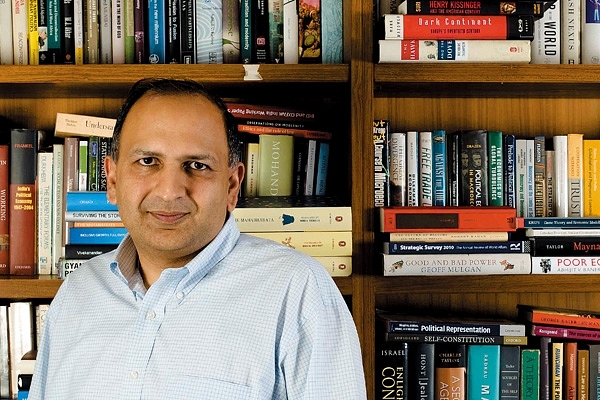I woke up to this column by Pratap Bhanu Mehta in Indian Express on the affairs of BJP. His critical analysis of BJP could not have come at a better time. It provides the much needed intellectual cover to the Congress and UPA2 as it “celebrates” its third anniversary.
It would however be presumptuous to ignore his critique of the BJP since his assessment, particularly on the authority of its central leadership, is not totally unfounded. BJP’s State leaders are capable and often self sufficient. He refers to the BJP as a collection of six to seven State parties, laments incoherence in economic policy and rues lack of purpose.
The BJP is differently organized as compared to the Congress. It has empowered State units, unlike the Congress, which works on a franchisee model. The family in Congress, irrespective of merit, occupies the leadership position. Congress’s franchisees (read State units) are subservient to the central leadership (read family) and derive legitimacy by their proximity to the power center. But does it nurture genuine leadership, promote new ideas and encourage alternate views ?
The fact that Congress party has not been able to think beyond Nehru’s socialist policies six decades after he first espoused them is a telling comment on its ingenuity. After all how can anybody from the Nehru-Gandhi family ever admit that Nehru’s policies were flawed ! And hence we are left with a system where every ill conceived policy is being covered by another poorly conceived policy – all to preserve the legacy. The country continues to bleed but who cares as long as the Congress retains power.
We would therefore much rather have a political party that has empowered State leaders with the flexibility to chart a governance agenda, which is best suited to the requirements of the State and its people. After all State is a legitimate administrative unit and the leadership is accountable to the people, who have elected them.These State leaders articulate BJP’s economic policies and agenda.
If incoherence of BJP’s economic policy is a concern for Mr Mehta he should spend some time in Gujarat to understand the various initiatives. He could similarly speak to Mr Raman Singh in Chhattisgarh, Mr Shivraj Singh Chouhan in Madhya Pradesh and Mr Manohar Parikkar in Goa. These men provide the party a sense of purpose and a vision for India’s future. Mr Mehta’s engagement with these Chief Ministers will give him an idea of what to expect if the BJP rose to power in Delhi. NDA’s record speaks for itself.
It is however not too difficult to understand Mr Mehta’s dilemma. Will any of these State leaders lead the party in 2014 or will it be someone else ? It is a fair question and most would like to have an answer. Fortunately for the BJP, unlike the Congress, leadership is not a birth right. People emerge over a period of time; sometimes it takes longer than expected, to fill the leadership vacuum. Mr Mehta concedes that Mr Modi may be the most popular leader within the BJP, but questions his ability to rise to national level and build a coalition. He is also quick to dismiss his candidature with the customary reference to 2002, passing reference to SIT’s report and limited public engagement.
Clearly Mr Mehta has chosen to ignore Mr Modi’s popularity, which is evident from favorable press and public surveys conducted by independent agencies. Yes, Mr Modi needs to step out of his State and engage with a wider audience but I hope Mr Mehta would grant him the prerogative to time his moves. After all he knows best. At this point it will be good to know that still waters run deep.
If Mr Mehta penned this article out of his desire to see a credible alternative to the Congress then who can disagree. But to denigrate the only legitimate alternative to the Congress, which is presiding over the worst catastrophe, is being unkind to India.
Support Swarajya's 50 Ground Reports Project & Sponsor A Story
Every general election Swarajya does a 50 ground reports project.
Aimed only at serious readers and those who appreciate the nuances of political undercurrents, the project provides a sense of India's electoral landscape. As you know, these reports are produced after considerable investment of travel, time and effort on the ground.
This time too we've kicked off the project in style and have covered over 30 constituencies already. If you're someone who appreciates such work and have enjoyed our coverage please consider sponsoring a ground report for just Rs 2999 to Rs 19,999 - it goes a long way in helping us produce more quality reportage.
You can also back this project by becoming a subscriber for as little as Rs 999 - so do click on this links and choose a plan that suits you and back us.
Click below to contribute.
Latest
